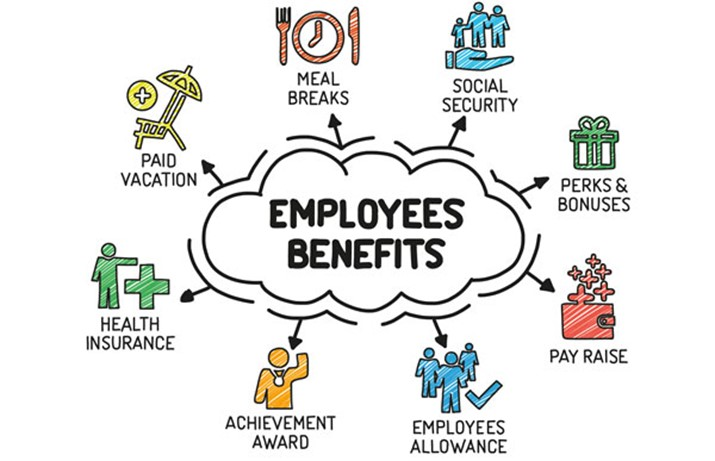It is important to know which benefits the law requires an employer to provide for an employee. Some optional benefits are used as compensation in the forms of retention and recruiting. These optional benefits are common and not required by law. 
This post is an opinion piece. Consult an attorney in your jurisdiction to determine the required benefits by law.
Employee benefits are also used to show appreciation for the employee and the work they perform. Some of these optional benefits include dental insurance, life insurance, paid leave, as well as retirement plans. In order to estimate the cost of employee benefits to employer, you’ll need to determine which benefits you’re providing.
Benefits that are required by law are important and must be given to every employee that is employed with a company or business.
All of these items should be outlined in an employee handbook. This should be distributed to employees on their first day of work.
Mandatory Benefits That Must Be Given To an Employee
FICA, Social Security, and Medicare:
The federal employment tax FICA is a tax that is collected for Medicare and Social Security. All persons employed with a company, including the employer, are required to have these funds deducted. Social Security Tax is another important tax that must be withheld by the employer. The Social Security tax must be withheld at the gross compensation of 6.2%, which is the Social Security base wage.
Medicare tax must also be withheld at the gross compensation of 1.45% as well as 0.9% of the compensation according to the amount of the employee’s threshold according to their filing status as Medicare a base wage. 6.2% of the Social Security base wage, as well as 1.45% of Medicare, must be matched, and the remaining 0.9% does not have to be.
Medical and Health Insurance:
If a company has 50 or more employees that are employed full-time, they must provide health insurance for the employee.
RELATED: 3 Important Tips When Shopping for Health Insurance on a Budget
RELATED: 5 Questions to Ask When Buying Health Insurance
Workers Compensation:
Insurance benefits that are offered to employees that become injured or ill, is known as workers’ compensation. Workers’ compensation varies according to each state. Purchasing disability insurance may be required in some states for employers.
Big companies that do not provide health insurance for their employees are at risk for possible assessment for not providing proper and cost-efficient health coverage to their employees and dependents of their employees.
If you, as an employee, have sustained injuries, know that you’re entitled to compensation. However, if you’re wondering about the process, your best bet can be to study through the URL and enlighten yourself about the compensation laws.
In many cases, when an employee is visiting various locations for work purposes, he/she is entitled to workers’ compensation in case of any misconduct or injury. It is an employee’s right to demand it!
For such cases, there are legal advisors available who can guide you better to get what’s yours.
You’ll need to consider this Useful guide to determine which benefits you’re providing.
Get in touch with any of your trusted lawyers to take the right move. You can click here to know more about the lawyers.
RELATED: Questions to Ask When Meeting a Lawyer
Medical and Family Leave:
Under the Family Medical Leave Act, particular employees are allowed 12 weeks of unpaid leave along with job protection for child adoptions, births, parental care, as well as caring for children or spouses that are battling serious health conditions or illnesses.
Eligible employees that qualify for FMLA must have completed at least 1,250 hours previously within 52 weeks. The leave can also be sporadic and not in just one period.
RELATED: 3 Tips on Going Back to Work After Maternity Leave
This includes job protection for up to 12 weeks, up to 12 months for the medical and qualified family for serious medical issues. For military medical caregiver leave, the employee is allowed 26 unpaid workweeks as well as job protection for a 12-month span.
Also, it depends on the length of time that the employee has worked for the company as well as the number of fixed hours an employee has worked.
Unemployment Insurance:
Unemployment insurance is used to render compensation for employees that experience an unexpected job loss that they did not cause. Unemployment insurance works differently according to the state the employee was employed.
Paid Vacation and Holidays:
Vacation and holiday time must be given to employees that are eligible. This time is received based on do you time that an employee has been employed with the company or business as well as hours the employee has collected.
Receiving these benefits is important not only for the employee but the employer as well. They are just as important as the wage that is received by the employee.
These benefits, although costly, are beneficial in the long run as they can attract employees, protect employers and employees, as well as offer helpful benefits for the employee and their families.
Related Posts:
[…] 6 Mandatory Benefits An Employee Is Entitled to Receive […]